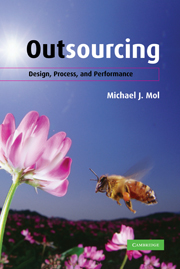Book contents
- Frontmatter
- Contents
- List of figures
- List of tables
- List of boxes
- Acknowledgments
- 1 Outsourcing
- 2 What we know about outsourcing
- 3 A new perspective
- 4 The outsourcing process
- 5 Shifting the curve
- 6 Shifts of the curve
- 7 Managing outsourcing
- 8 Outsourcing research agenda
- 9 Future trends and conclusions
- Appendix
- References
- Index
2 - What we know about outsourcing
Published online by Cambridge University Press: 03 February 2010
- Frontmatter
- Contents
- List of figures
- List of tables
- List of boxes
- Acknowledgments
- 1 Outsourcing
- 2 What we know about outsourcing
- 3 A new perspective
- 4 The outsourcing process
- 5 Shifting the curve
- 6 Shifts of the curve
- 7 Managing outsourcing
- 8 Outsourcing research agenda
- 9 Future trends and conclusions
- Appendix
- References
- Index
Summary
A common refrain of scholars of management and many other areas is the lack of literature in the area they study in order to legitimize their own research. For outsourcing, such claims can no longer be valid. A search of the Business Source Premier database on the keyword “outsourcing” generated a staggering 2,669 peer-reviewed articles using outsourcing in their titles, keywords, or abstracts, 917 of which were published in 2004 and 2005 alone. In the non-peer-reviewed category a further 19,364 articles appeared. Furthermore the Library of Congress holds 337 books and documents for which outsourcing is a keyword. Outsourcing, in short, is a hot topic academically. Clearly, in the presence of such a plethora of writings, any claim to newness cannot be based on having found an understudied topic. As the necessarily incomplete review of the literature contained within this chapter shows, many of the sub-areas of outsourcing are now quite populated with research studies as well. Carving out an original research contribution has, therefore, not become any easier over the years. In this chapter I will first look at some of the advantages and disadvantages of outsourcing as the literature has discussed them. This is followed by an investigation of the various business functions on which outsourcing research has focused. Then I will talk about what knowledge the study of various countries and industries has produced for our understanding of how context affects outsourcing.
- Type
- Chapter
- Information
- OutsourcingDesign, Process and Performance, pp. 22 - 47Publisher: Cambridge University PressPrint publication year: 2007



